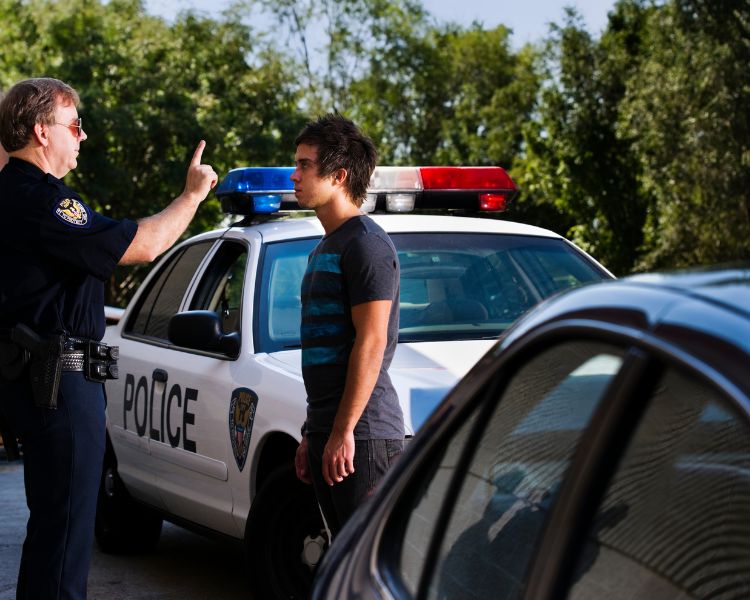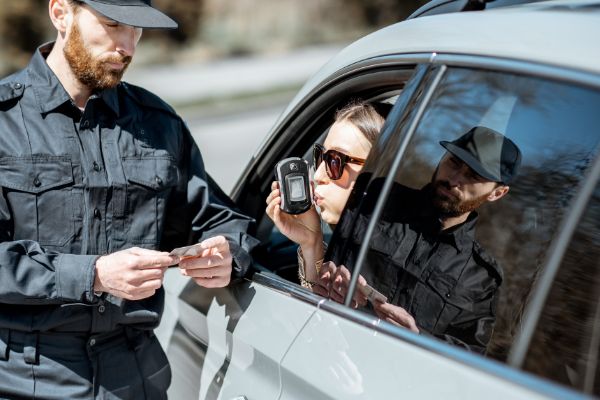
Field Sobriety Tests are used by police officers when they pull over a driver and suspect that the driver is drunk. The test is theoretically designed to assess the cognitive behavior of a driver to determine their sobriety. However, field sobriety tests are not accurate, and a variety of factors can cause a driver to fail – even if sober.
So, is it legal to refuse a field sobriety test? Yes. These are completely voluntary, and drivers, sober or impaired, are encouraged to refuse them.
Learn what happens after you refuse a field sobriety test, why field sobriety tests should be refused, and what to do if you are charged with a DUI in Maryland.
Disclaimer: articles on sallerlaw.com are not intended as legal advice and should not be taken as such, please consult an attorney for advice about your individual situation.
Refusing a Field Sobriety Test in Maryland
Field sobriety tests in Maryland, like in most states, are voluntary. Drivers are often not informed of this and feel obligated to comply when pulled over and accused of driving under the influence. Sober drivers especially feel they can complete a field sobriety test and get back on the road without any harm done.
Field sobriety tests, however, are not accurate 100% of the time.
Nervousness, prescription medications, disorientation, and more can influence a person’s performance of a field sobriety test and lead to an arrest even if sober. This is why many criminal defense lawyers argue against taking a field sobriety test – you are likely to be arrested anyway, regardless of your sobriety.
Refusing a field sobriety test does not mean you are let go and accusations are dropped.
While field sobriety tests in Maryland are voluntary and can be refused, you will face serious consequences if you refuse a chemical test, which is often requested after you deny a field sobriety test. Chemical tests include a blood draw or a breathalyzer test and these are legally required to comply with.
While waiting to complete a chemical test, you may be taken to a police station and held awaiting results. It is important, at the first mention of a field sobriety test, to refuse and request to speak with your lawyer.
Reliability of Field Sobriety Tests
The US Department of Transportation has found that field sobriety tests identify drunk drivers in an average of 70% of DUI cases; this finding indicates that field sobriety tests indicate intoxication even in a number of sober drivers.
What affects the reliability of field sobriety tests?
- The officer’s personal judgment on the accuracy of completion
- Nervousness of being pulled over and accused of drunk driving
- Prescription medication
- Pre-existing balance issues
- Medical conditions
Why Refuse a Field Sobriety Test
At the end of the day, refusing a field sobriety test is not only legal, it is recommended by criminal defense lawyers. Field sobriety tests are not accurate and can skew in the direction of a DUI charge regardless of sobriety.
If a field sobriety test has been used as evidence for your DUI charge, see the 4 ways you can fight a DUI charge in Maryland. A cop’s judgment is not foolproof, and field sobriety tests rely heavily on an officer’s judgment to make a call.
Remember: Blood draws and breathalyzer tests are the only tests you are legally required to comply with. There are no legal or MVA-related consequences for refusing a field sobriety test.

Contact Your Attorney If You're Charged with a DUI
Refusing to complete a field sobriety test and not speaking until you’re with an attorney is the best thing you can do in the event of a DUI arrest. Saller Law is a leading DUI law firm in Baltimore, having helped hundreds of individuals in their DUI arrests.
We examine the evidence, look at tests that were conducted to determine sobriety, and recommend the best defense to protect your rights. Call us for your first DUI arrest, a repeat DUI charge, or even your DUI arrest out of state. We’re here to help.
Frequently Asked Questions
Is it legal to refuse a field sobriety test in Maryland?
Yes. Field sobriety tests are completely voluntary in Maryland, and drivers are not legally required to take them.
What happens if I refuse a field sobriety test?
Refusing a field sobriety test does not mean you are free to go. Police may still arrest you and request a legally required chemical test, such as a breathalyzer or blood test.
Why do lawyers recommend refusing a field sobriety test?
Field sobriety tests are not always accurate. Nervousness, medical conditions, or medications can cause sober drivers to fail, which often leads to unnecessary DUI arrests.
Are there any penalties for refusing a field sobriety test?
No. Unlike refusing a chemical test, refusing a field sobriety test has no legal or MVA-related consequences in Maryland. However, you may still be arrested for suspicion of driving under the influence.
What should I do if I am arrested for DUI after refusing a field sobriety test?
You should remain silent and request to speak with an attorney immediately. A lawyer can review the evidence, challenge the field sobriety test, and build your defense.
-
In every case, we work directly with clients from the beginning to the end of a case. We hear about many lawyers who take the money and their client interaction doesn’t take priority. We know that an ideal outcome must come from collaboration with our clients. This approach ensures that everybody gets a fair deal – that our clients are never run over by what can be an unfair system.
If you have been charged or are being investigated, it is absolutely crucial to begin defending as soon as possible. We encourage you to get in touch.


